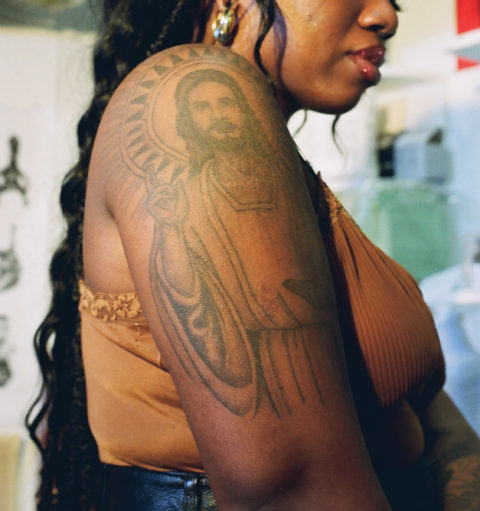Darker skin tones have long been under-represented in the tattoo world. Brooklyn-based artist Tann Parker founded Ink The Diaspora to change that.
Date May 17, 2021
I got my first tattoo before heading off to college. I had a job at McDonald’s and didn’t have to get permission from my parents since I was 18, so I thought, “Hell yeah, I’m going to get a tattoo.” It was very impulsive. You know the shoe brand Steve Madden? It was their logo from the early 2000s: a peace sign, a heart and a stiletto — but I changed the stiletto to a slouchy boot because that was popular at the time. I remember that the tattoo artist called me before the appointment to clarify that it was what I wanted.

That tattoo has since been covered up with something more meaningful: a family tree that represents each of my older siblings and my parents. The most meaningful tattoo I have, though, is a portrait of my grandmother on my right leg. It’s the only photo my mom has of her. I’m also getting a tattoo of my dad’s mom on my left leg. It’s my way of connecting with them since I never got to meet either of my grandmothers. Many of my tattoos are inspired by my being Black; I have a Harriet Tubman tattoo, a Buffalo Soldier on one leg, Black cherubs playing the violin and Black Jesus on my shoulder.
I started Ink The Diaspora in 2018 because I wasn’t seeing people with my skin complexion getting heavily tattooed. I wanted to build a community where we could have conversations about what’s happening in the tattoo space. Ink The Diaspora has many faces, but it’s mainly an archival resource on Instagram and a place for decolonizing the tattooing practice. Because of colourism in the tattoo space, representation of darker-skinned Black and brown folks just isn’t there. Or if it is, we only see tattoos on a very specific type of Black skin. There’s very little diversity.

I also do consultations and tattoo-artist referrals for Black tattoo collectors who are looking for a Black artist. I want to be really sincere about referrals, which can be difficult if I haven’t been to a certain state or city. So I tap into the Ink The Diaspora Instagram and ask “Does anyone know a Black tattoo artist in this location? Has anyone gotten a tattoo from this person and enjoyed their experience?” That is my top priority. I’m also a non-binary person, so I always try to refer Black trans tattooers. I want to give money back to my community, whom I’m inspired and driven by.
My next intention for Ink The Diaspora is to create silicone tattoo sheets in shades of brown, for darker skin tones. If you think about the tattooing process, it always starts with a white sheet of paper — showing you what a tattoo would look like from a white perspective. Changing the medium and your visual starting point, by doing something as simple as not using white paper as your canvas, can change your creative process.
—As told to Amanda Demeku

